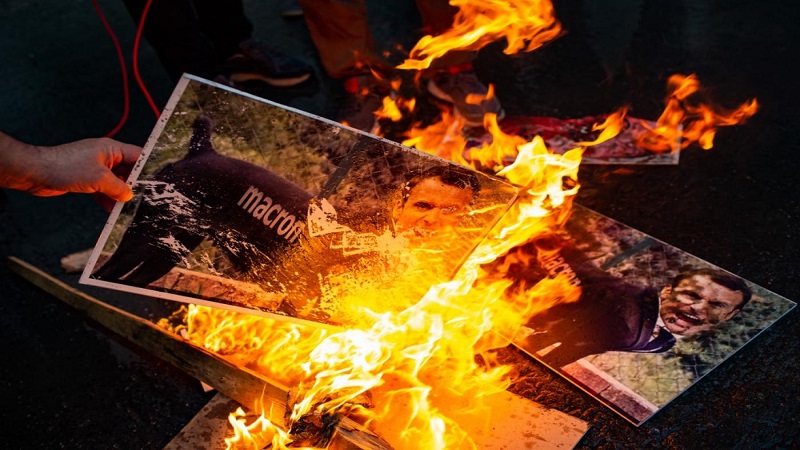Alittle magazine on the fringes of the French media mainstream continues to polarise public debate not just in France, but across the Muslim world.
Their pitiable cartoons of the Prophet Muhammad have provided fodder to populists on both sides of the divide – first and foremost, French President Emmanuel Macron and Turkish President Recep Tayyip Erdogan. The former used the heinous terrorist killing of a French schoolteacher to double down on what has already been his longstanding secular crusade against Islam and Islamism. The latter tried to exploit the episode to play identity politics.
Geopolitical standoff
It is a war over narratives that both populists want, and it complements a geopolitical standoff between France and Turkey across the Mediterranean. It reveals an ideational fault line that appears to divide not just French society, but also increasingly the Arab and Muslim world: the political equilibrium between religion and state.
Macron has thereby become Europe’s strongest advocate for the purge of Islam from politics and the supremacy of civil state institutions and norms over religion – a campaign which the UAE has also embarked upon under the banner of “tolerance” in the wider MENA region.
Ideological synergies with the Emirates in what appears to be an illiberal crusade against Islam wrapped in the narratives of “tolerance” are not coincidental. For years Abu Dhabi has found in Macron a willing pawn to demonise Islam’s mobilising power as the supposed root cause of terrorism.
France’s obsession with the supremacy of the state over religion made it an ideal ally for the UAE in its post-2011 pursuit of authoritarian stability in the Arab world. Labelling Islamists of all shapes and forms terrorists has helped the UAE justify their counterrevolutionary campaigns that was meant to set the clocks back to before the Arab uprisings – not least in Libya where France has become the UAE’s most important Western ally.
The country of Voltaire, Montesquieu and Rousseau has embraced laicite as a strict form of separating state and church, in pursuit of anti-clericalism, which in the 18th century meant to limit the influence of the clergy over statecraft. This Jeffersonian argument has been increasingly exploited by the French state to curtail religious freedoms in the name of secularism, subordinating the role of religion to the state in the public sphere.
The absurdity of Muslim women having to replace their burqas with face masks when entering the Parisian Metro amid Covid-19 shows how far the French state goes to enforce assimilation under the banner of secularism.
Illiberal liberalism
Assimilation as the ideological foundation of French colonialism still remains the cornerstone of French immigration policy, whereby societal cohesion is believed to be best achieved by forcing immigrants to conform to French norms and values – including those tied to laicite.
Macron’s latest comments on Islam are based on an institutionalised legacy of illiberal liberalism in France: one where liberalism and secularism forces minorities to conform to a general will not consensually defined, but imposed by the majority.
While the Chinese genocide against the Muslim Uighurs – undoubtedly the greatest global threat to religious freedom at the moment – is certainly an extreme parallel to draw here when looking at French calls for state-enforced “reforms” of Islam, China’s entire policy vis-a-vis the Muslim minority is also founded on ideas of forced assimilation.
At the heart of both campaigns is the premise that Islam needs to be controlled by making Muslims assimilate to the “core culture” of the majority.
It is in this context that Islam has been securitised in France as the root cause of extremist violence in recent years – of which there has been a lot. France refuses to critically reflect on what can only be described as a failed integration policy revolving around one-dimensional interpretations of French norms and values.
The French answer to multiculturalism has thereby often been the absence of tolerance and diversity, particularly when it comes to accommodating Islam as the religion of nearly 10 percent of French people.
Macron’s state-led initiative to “reform” Islam has relied on the Islamic bogeyman to spread the narrative that crimes committed by a tiny fraction of individuals who falsely claim allegiance to Islam can be attributed to the religion of two billion people.
Macron’s deliberate broad brush further alienates, marginalises and stigmatises, sowing further seeds of extremism in an already alienated community in France. The abhorrent terrorist attack in Nice on Thursday is another symptom of a campaign that ignorantly pits Muslims against the French mainstream.
False dichotomy
The social cohesion of a country in an unprecedented economic and health crisis is at stake, and yet the president appears to be providing more ammunition for identity politics by deliberately insulting people’s religious dignity. Even if most Muslims agree that bigotry and ignorance can never insult Prophet Muhammad, French illiberal liberals see themselves confronted with a global Muslim public sphere yearning for dignity and respect.
To them, the false dichotomy propagated by the French mainstream between freedom of expression and the sacred protection of one’s dignity misses the point. In a tolerant, liberal society, norms and values should be resilient enough to find a balance between one’s right not to be insulted and freedom of expression.
The hypocrisy with which the Charlie Hebdo debate has entered into its next round is exemplified by how Twitter in France has enforced the controversial French cybercrime law, muting a vulgar tweet by Turkey’s deputy culture minister, Serdar Cam, directed against Hebdo. It seems that while the magazine’s right to insult Islam is deemed sacrosanct by the state, France has no problem curtailing that right to insult where it sees fit.
It is that double standard that renders France’s debate about freedom of speech meaningless, and reveals the double standards by which France is trying to force Muslims to become “more French”.






 WhatsApp us
WhatsApp us 

